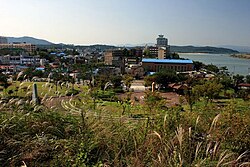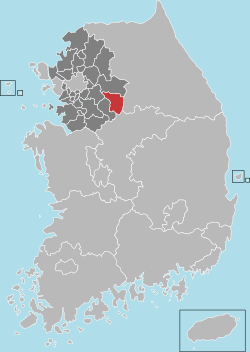Yeoju County
|
Yeoju 여주시 |
|
|---|---|
| Municipal City | |
| Korean transcription(s) | |
| • Hangul | |
| • Hanja | |
| • Revised Romanization | Yeoju-si |
| • McCune–Reischauer | Yŏju-si |

At Yeongwollu
|
|
 Location in South Korea |
|
| City |
|
| Region | Sudogwon |
| Administrative divisions | 1 eup, 8 myeon, 3 dong |
| Area | |
| • Total | 608.64 km2 (235.00 sq mi) |
| Population | |
| • Total | 104,774 |
| • Density | 172.1/km2 (446/sq mi) |
| • Dialect | Seoul |
Yeoju (Korean pronunciation: [jʌ.dʑu]) is a city in Gyeonggi Province, South Korea. Yeoju was a county but was raised to the status of a city in September 2013. Together with the neighboring city of Icheon, it is known as a major center of contemporary South Korean ceramics, and hosts the World Ceramic Exposition every year. Other local products of note include rice, sweet potatoes, and yellow melons. Yeoju is the birthplace of Korea's last queen, Empress Myeongseong.
Yeoju's institution of higher learning includes Yeoju Institute of Technology. The Jungbu Naeryuk Expressway passes through the city.
There have been human settlements in the Yeoju area since Paleolithic times. At the Heunam-ri archaeological site, just southeast of the city proper, fragments of herringbone patterned earthenware pottery, axe heads, and other artifacts have been discovered. Further excavations from research teams and accidental findings from construction in the area have continued to reveal the continued human presence through the Neolithic era up to the beginnings of recorded history.
Due to its location on the Namhan River. Yeoju was a geographically strategic point for the rulers of the Silla kingdom. During the reign of King Pasa 5th ruler of Shilla from 80-112 AD, the mountain fortress of Pasaseong-ji was constructed just downriver from Yeoju on Pasa Mountain. The fortress continued to be used in later dynasties, until its importance faded due to the usage of Namhansanseong became more prevalent. The majority of the 1,800 meter long wall still stands today and can be accessed by hiking trails.
...
Wikipedia
